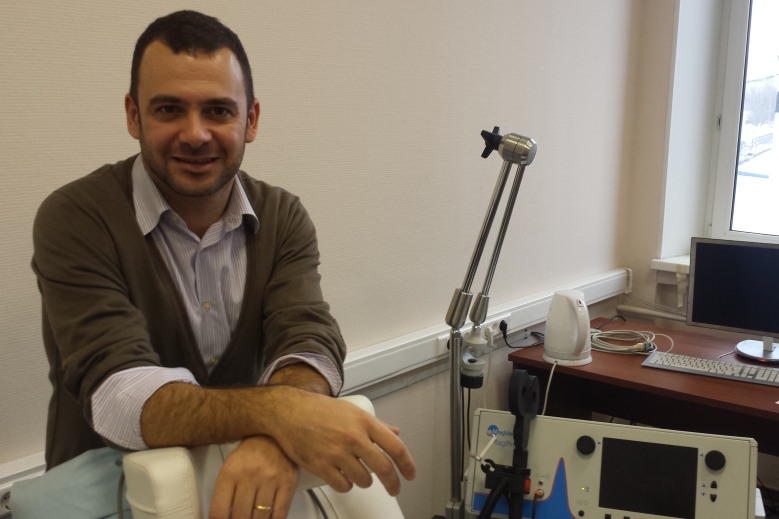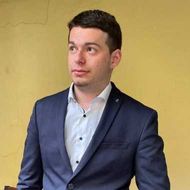- A
- A
- A
- ABC
- ABC
- ABC
- А
- А
- А
- А
- А
- HSE University
- Faculties
- Faculty of Social Sciences
- School of Psychology
- News
- 'I Felt Welcomed and This Is Important': interview with Matteo Feurra in the HSE LooK
-
Education
-
The School
- About
-
Laboratories
-
- The Scientific-Educational Laboratory of Ability Psychology
- Center for Sociocultural Research
- International Laboratory of Positive Psychology of Personality and Motivation
- Laboratory for Cognitive Research
- Cognitive Psychophysiology Laboratory
- Vision Modelling Laboratory
- Laboratory for the Neurobiological Foundations of Cognitive Development
-
- Partners
- Staff Members
- International Cooperation
Phone: +7 (495) 772-95-90 *15366
Email: dekpsy@hse.ru
Address: 101000, Moscow, Armyanskiy per. 4, c2
Address for correspondence: 20 Myasnitskaya Ulitsa Moscow 101000 (School of Psychology)
In press
Popyvanova A., Pomelova E., Bredikhin D. et al.
IEEE, 2024.
Zaidi S. G., Orazmukhametova L., Zahra S. K. et al.
TPM - Testing, Psychometrics, Methodology in Applied Psychology. 2025. Vol. 32. No. S8. P. 2025-2035.
Tunkevichus O., Bagrationi K.
In bk.: The Proceedings of the 20th European Conference on Innovation and Entrepreneurship. Vol. 20. Iss. 1. Academic Conferences International Limited, 2025. P. 759-766.
Ivanova M., Germanova K., Petelin D. et al.
Biorxiv. 005140. Cold Spring Harbor Laboratory, 2024
The School promotes cutting-edge research, multidisciplinary studies, education in English. We are increasing the number of courses in English all the time and have started two English-speaking Master’s Programs. Our researchers have access to Eye trackers, TMS, multi-channel EEG, MEG and fMRI techniques.
The School also aims to train psychologists, who can apply their knowledge in the fields of economics, banking, human resources management, organizational development, ecopsychology and team-building.

'I Felt Welcomed and This Is Important': interview with Matteo Feurra in the HSE LooK

What is the focus of your research in psychology?
Basically, my topics are memory and motor control. To study memory I started with cognitive processes and recognition processes. I used faces as a research object because they represent very complex items to remember and recognize. They activate the whole network in our brains: there are certain areas that respond very well to faces compared to other objects. We can recognize faces thanks to our visual perception, but this also has to be integrated with the semantic context related to the person. My research aims to understand how semantic context affects face recognition. When I was working in LondonI investigated how much personal information is important for face memory.
Some people are very good at recognizing people they have met, while others find it hard to remember faces. What are factors here?
Context is very important for memory functions. We call it the butcher-on-the-bus phenomenon. You go to the butcher shop to buy meat, so you always see that person in that particular context. But if you meet the butcher on the bus you can’t recognize him because you’ve lost the semantic background.
Will you continue studying face recognition?
I have moved away from this topic a little bit because I was attracted by another brain stimulation technique, transcranial magnetic stimulation. I extended my feld of interests to memory for objects and landscape in order to get a deeper understanding of how the network underlying memory processes works. In London I met an interesting Japanese researcher, Ryota Kanai, who was like a second mentor for me. Together we pioneered a new advanced technique of brain stimulation, the transcranial alternating current stimulation. Usually psychologists use brain stimulation to interfere in various brain areas in order to build functional maps of cortical networks. My purpose was to change the way we use brain stimulation and to start using it for boosting brain processes. I went back to Siena and continued with this new technique. Finally, I mastered it and published a paper. This allowed me to get a young investigator grant in Italy as a principal researcher. The grant was awarded by the Ministry of Health as this method can be used as a neuro-rehabilitation technique for patients with memory diseases, motor disorders and other kinds of impairments. I got consistent funding for three years to create my group in Siena and this project is still on going.
Can people train their memory to remember things they usually tend to forget?
I also encounter this kind of problem. Sometimes I am so focused on work and things I have to accomplish during the day that I forget where I parked my car. You need to develop some routine so that you can remember things using your procedural memory, the kind of memory you use when you learn how to ride a bike, for instance, and for other automatic processes. Besides, you need to stay focused and not get distracted by thoughts. Nowadays Google maps and electronic devices can help as well.
Why did you apply for this position at the HSE?
I went to the lab during my frst visit and I saw that this university has modern equipment that will allow me to go further with my research and lead my group. That’s the plan – creating my group and doing research in brain stimulation by combining different techniques. I could also see other professors’ interests in what I do, I felt welcomed and this is important for me personally. Later on I began reading about the institutional development program and learned that the HSE is committed to growth and science.
Is there a list of things you would like to accomplish during your frst years at the HSE?
I am planning to move along further with the existing projects. I have an experimental plan for memory and motor control studies. It includes experiments on the mirror neurons system, memory and more basic research related to the neuro-imaging technique. All these merge into the big topic of brain stimulation with the focus on improving cognitive processes. Now I have to understand what it is that PhDs might be interested in, in this sphere. I had a seminar with Master’s students and they seem to be very interested in my topic. I plan to engage them in something practical, to demonstrate brain stimulation in action which might be interesting and even striking for them. So my plan is to continue the projects I started in my country and find the right people to work with on them here.
The full text of the Issue (10 (17), December 2014) The HSE Look
- About
- About
- Key Figures & Facts
- Sustainability at HSE University
- Faculties & Departments
- International Partnerships
- Faculty & Staff
- HSE Buildings
- HSE University for Persons with Disabilities
- Public Enquiries
- Studies
- Admissions
- Programme Catalogue
- Undergraduate
- Graduate
- Exchange Programmes
- Summer Schools
- Semester in Moscow
- Business Internship
- © HSE University 1993–2025 Contacts Copyright Privacy Policy Site Map
- Edit


